Bartleby is an online homework help and writing support service popular with college students. It offers step-by-step textbook solutions, expert Q&A, and essay help tools in one platform. This article reviews what real users say about Bartleby, its pricing structure, how it works for students and tutors, and how it compares to alternatives. We also highlight Bartleby’s company background and future plans, and why My Engineering Buddy is a strong alternative for personalized tutoring.
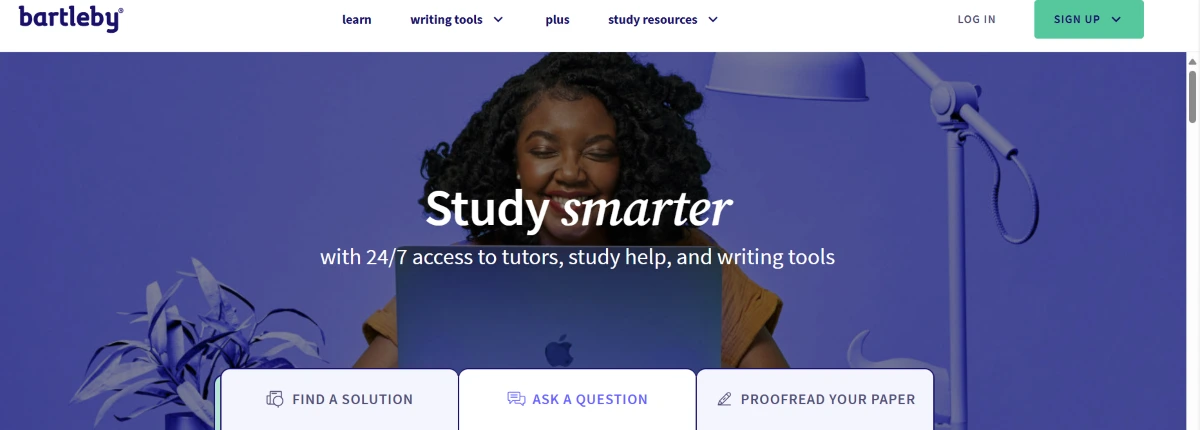
Bartleby Reviews and Testimonials
Feedback on Bartleby is mixed, with a contrast between official review sites and user complaint forums. On Trustpilot, Bartleby holds an average rating around 4.3 out of 5 from thousands of users. Many students praise the service for its quick homework solutions and convenience, indicating that Bartleby has helped them study more effectively. These positive reviews suggest that Bartleby is a legitimate platform (not a scam) that reliably provides the advertised study resources. Its popularity and large user base further reinforce that Bartleby is an established, real company, not a fraud.
However, on consumer complaint sites and other review platforms, negative testimonials appear. For instance, on Sitejabber Bartleby has only 1.5 stars out of 5 from a handful of reviews, with users reporting dissatisfaction. Common complaints include unexpected charges and difficulty canceling subscriptions. Some users claim Bartleby continued billing them even after cancellation requests, leading to frustration. The Better Business Bureau (BBB) gives Bartleby an “F” rating, citing multiple unresolved complaints about billing issues, These reports have led a few students to label Bartleby a “scam” in their comments when they encountered trouble stopping the service. On the whole, Bartleby’s reputation is a mix of positive outcomes (effective study help for many) and cautionary tales (from those who had customer service or billing problems).
Is Bartleby legit? In summary, yes – Bartleby is a legitimate educational service operated by a real company and used by many students worldwide. It provides actual textbook solutions and expert answers, not fake promises. The core offerings do work as advertised for the majority of users. However, the numerous complaints about cancellations and charges suggest Bartleby has had customer service shortcomings. Students should be mindful to cancel properly if they only want a short-term use. Despite the negative anecdotes, Bartleby is not a scam; it’s a real study tool – just one that has received criticism for how it handles billing and support issues. Always read the fine print (like auto-renewal terms) to avoid any surprises.
Bartleby Pricing
Pricing Range
Bartleby’s pricing is subscription-based, with a range of plans for different needs. The base plan Bartleby Learn costs about $9.99 per month (after an initial trial period. This gives access to their library of textbook solutions and a limited number of questions you can personally ask experts each month. For a more comprehensive package, Bartleby Plus (also written as Bartleby+) bundles all study and writing tools for roughly $14.99 per month after a trial. Bartleby Plus includes the homework help features of Learn as well as the premium Write tools (plagiarism checker, grammar and citation help) in one subscription. In addition, Bartleby offers on-demand tutoring sessions for separate fees (not included in the monthly plans): for example, about $15 for a 30-minute live tutoring session or $30 for a 1-hour session. In summary, students can expect to pay around $10–$15 monthly for the self-study plans, with optional add-on tutoring if needed.
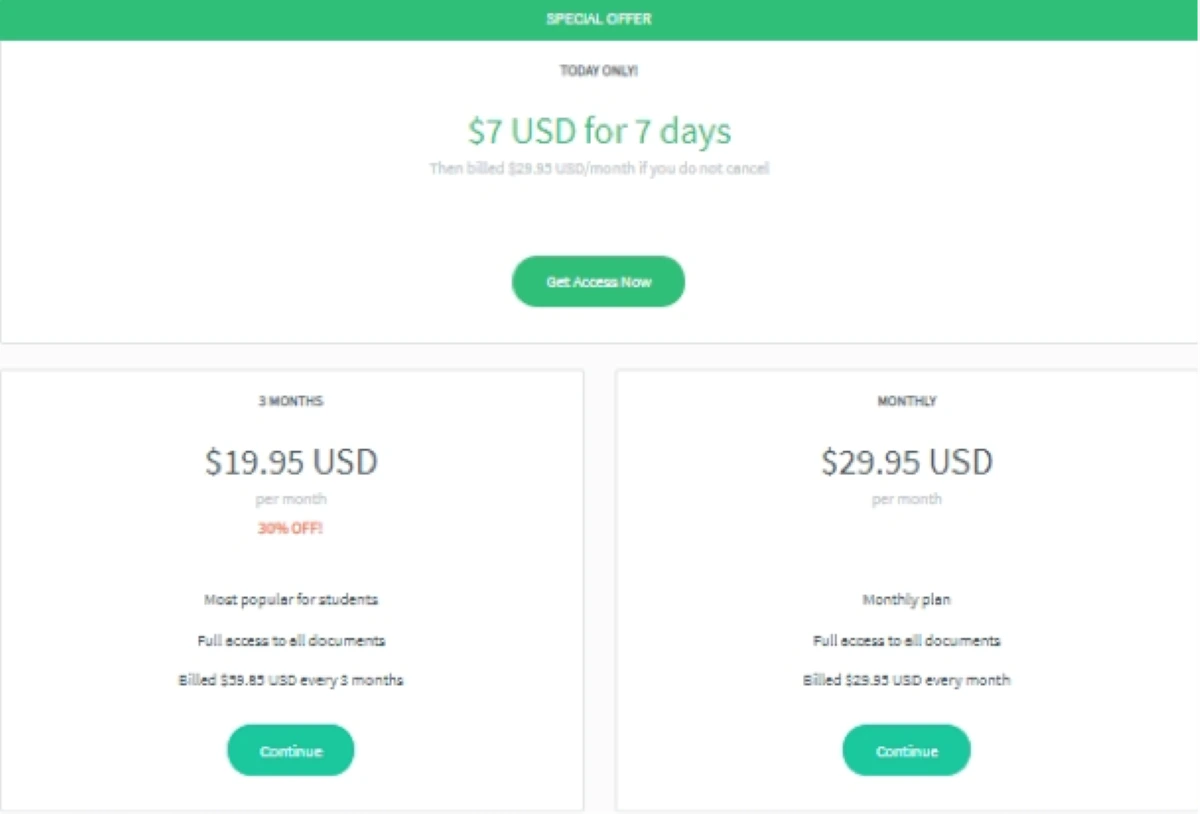
What Students Say About Bartleby Pricing
Student opinions on Bartleby’s pricing are divided. Many feel that the monthly cost is reasonable compared to hiring a private tutor or the value of getting unstuck on tough homework problems. At ~$10 a month, Bartleby Learn is seen as affordable “insurance” to get help throughout a semester. The bundled Bartleby Plus at ~$15 is also considered a good deal by some, since it combines homework help and writing assistance that might otherwise require two separate services. In fact, independent reviewers note Bartleby is often more affordable than competitors like Chegg or Grammarly when you consider the features included. This budget-friendly reputation is a selling point in positive reviews.
On the other hand, some students have criticized Bartleby’s pricing practices. A frequent complaint is the way the trial and renewal are handled. Users have reported being charged for a full month (or even a few months in advance) when they thought they were only signing up for a short trial. For example, Bartleby ran a promotion “$7 for 7 days,” after which the subscription renewed for a $29.97 charge (equivalent to three months at $9.99) if not canceled. Students who missed the fine print were unpleasantly surprised by these charges. Some feel the limited number of expert questions allowed (e.g. 5 Q&A questions per month on the basic plan is low for the price – if they need more help, they’d have to pay for tutoring minutes or upgrade. Overall, students appreciate that Bartleby is relatively low-cost, but they advise to watch out for auto-renewal and understand exactly what is included in each plan.
Hidden Costs
Bartleby’s subscription model means the main “hidden” costs to be aware of are the auto-renewals and any usage beyond plan limits. The service will automatically renew and bill you each period until you cancel, which has caught some users off guard. This isn’t unique to Bartleby, but the complaints suggest Bartleby’s cancellation process has been confusing for some. If a student thinks they signed up for only a trial or one month, they might later see repeat charges because the subscription continued by default. Always make sure to actively cancel via your account page or support email once you’re done using Bartleby; otherwise, charges will continue. Another potential extra cost is if you need more expert help than your plan provides. For instance, the basic plan might allow 5 question submissions per month– if you have a lot of questions beyond that, you would need to either upgrade to Bartleby+ or purchase tutoring sessions. Those one-on-one tutoring sessions have their own fees ($15, $30, $54 packages as noted). The good news is there are no microtransactions for individual textbook solutions – those are unlimited with a subscription. There are also some completely free features (like limited access to essay templates or a few homework solutions) for non-subscribers, but the core service is paywalled. In summary, read the plan details carefully so you know the limits (questions per month, trial duration) and avoid any unexpected costs.
How Bartleby’s Pricing Works
Bartleby’s pricing works on a subscription tier system. Here’s a quick breakdown of the offerings in 2025:
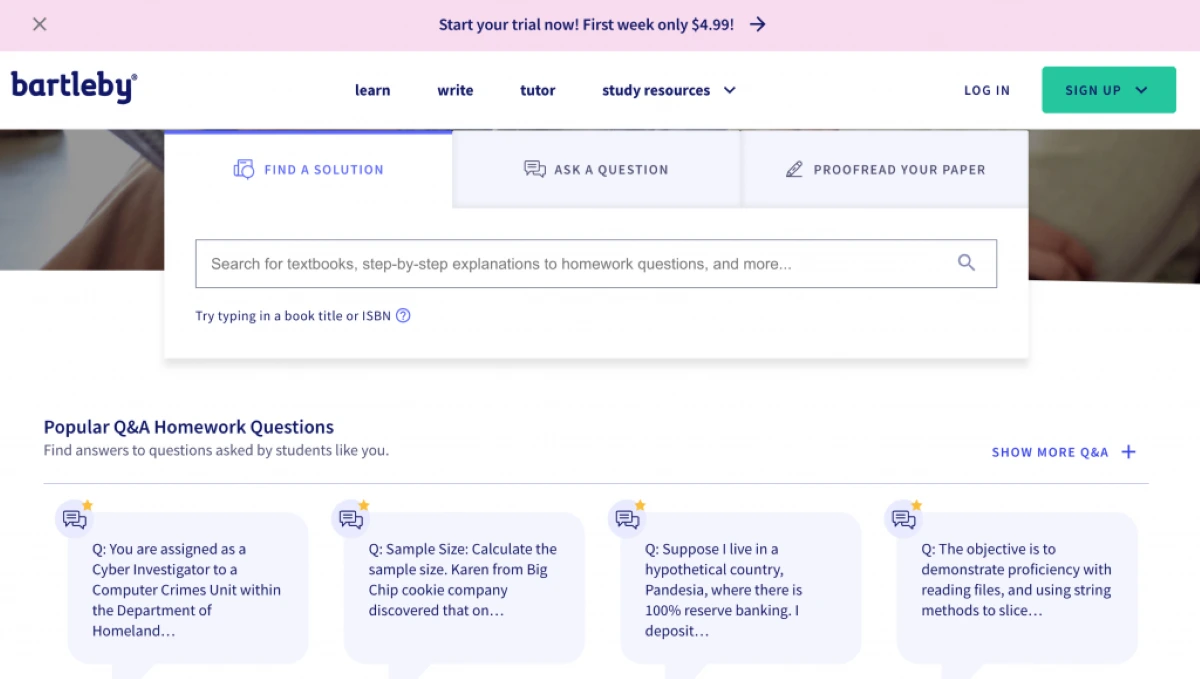
- Bartleby Learn: monthly subscription (~$9.99/month after trial) focused on homework help. This includes unlimited access to their database of textbook solutions and to the library of already-answered Q&A problems. It also lets you ask a limited number of new questions to Bartleby’s experts (the number of “ask a question” credits per month is fixed – for example, 5 questions/month on the standard plan). The first 7 days are offered at a reduced price (often around $4.99) as an introductory trial. After that week, it bills the regular monthly rate.
- Bartleby Write: a separate subscription (~$9.99/month on its own) for writing assistance. It provides tools like a plagiarism checker, grammar and spell checker, citation generator, and even AI-based essay feedback. Bartleby Write also has a free mode with basic functionality (like an essay template builder and a limited grammar checker), but the paid mode unlocks full features including advanced grammar suggestions and plagiarism scans. Students can use this to polish their papers before submission.
- Bartleby Plus (Bartleby+): a bundle that combines Learn and Write in one plan (~$14.99/month). Bartleby Plus is the “all-in-one” subscription – it gives 24/7 access to the homework solutions library, expert Q&A help, the AI-powered writing tools, and even a math solver and citation assistance. It’s basically the sum of Learn and Write, and it’s cheaper than buying both separately. Bartleby Plus often has a trial offer as well – for example, $6.99 for the first week– then it renews at the standard monthly price.
- Bartleby Tutor: an on-demand tutoring service that does not require a subscription – it’s pay-as-you-go. If you need live help beyond what the written solutions provide, you can request a 1:1 session with a tutor at any time. The fees in 2025 are roughly $15 for a 30-minute session, $30 for 60 minutes, and $54 for 120 minutes. These sessions can be done via messaging chat or audio call with an expert. Notably, Bartleby gives new users a free 15-minute tutoring session as a trial. After that, you buy tutoring minutes as needed. Any unused minutes can roll over to your next session, so you don’t lose what you paid for if you don’t use it all at once
All payments are handled via credit/debit card on file, and subscriptions will renew automatically on a monthly (or annual, if you chose that) basis. Bartleby often partners with college bookstores and other platforms, so sometimes students encounter Bartleby offers when buying textbooks or class materials (e.g. an offer to try Bartleby for a week for a small fee). Keep in mind those are introductory deals that lead into the standard subscription unless canceled.
Free Trial
Bartleby does offer a kind of free trial, though it’s usually a paid trial at a very low cost. Commonly, new users can get the first 7 days of Bartleby Learn for $4.99 (or a similar token amount). In some promotions it has been $7 for 7 days, or even $1 for 7 days – the exact price can vary, but the idea is you pay a small fee to try it for a week. During that trial week, you have nearly full access to the service. For Bartleby Plus, the trial might be slightly higher (e.g. $6.99 for the first week of all features). There is no completely free week-long trial without a payment method; Bartleby requires entering a card and paying the trial fee to start the subscription. After the 7-day trial period ends, the subscription renews at the normal monthly price unless you cancel beforehand. For Bartleby Write alone, they don’t advertise a separate trial because the free mode of the writing tools is always available to test basic features. And for Bartleby Tutor, as mentioned, new accounts get one free 15-minute tutoring session to try out the live help service. In summary, you can try Bartleby at low cost for a short time, but be aware that you must cancel in time if you don’t want to continue, or it will begin charging the regular fees.
Refund Policy
Bartleby’s refund policy is somewhat strict. By default, “all payments are final and no refunds will be issued” once a subscription or service is charged. This means if you forget to cancel in time or you’re dissatisfied after using it, the company’s official stance is that they won’t refund that month. However, Bartleby does have a limited Money Back Guarantee for new users in specific cases. Under this guarantee, you can request a full refund of your purchase within 30 days if you are not satisfied, but only if you meet certain conditions. Those conditions include not having used more than a few of the service’s resources (for example, you shouldn’t have asked more than 1 homework question or unlocked more than 5 textbook solutions if you want the refund. Essentially, it’s a satisfaction guarantee for light users – if you tried it and realized it’s not for you, and you haven’t heavily consumed the content, they’ll give your money back. This guarantee can only be used once per customer. In practice, some students have reported that Bartleby’s customer support did grant them refunds as exceptions, especially if there were extenuating circumstances or confusion (Bartleby has occasionally provided goodwill refunds when pressed, such as refunding a $29.97 charge after a student complained of an unwanted renewal). But these seem to be case-by-case. The safe assumption is that you won’t automatically get a refund unless you qualify under the official guarantee or argue your case to customer service. Therefore, always cancel promptly if you decide you don’t need the service, to avoid being charged, because once charged you may not get that money back.
Bartleby Alternatives
While Bartleby offers a broad set of study tools, some users look for alternatives for various reasons. It could be due to pricing, specific subject needs, or dissatisfaction with the service. Some students want more personalized help, while others seek free or cheaper options. Below we introduce several top alternatives to Bartleby in 2025, each with its own strengths. These range from major homework-help platforms like Chegg to specialized tutoring services like My Engineering Buddy. Exploring alternatives can help you find the service that best fits your learning style and budget.
Chegg
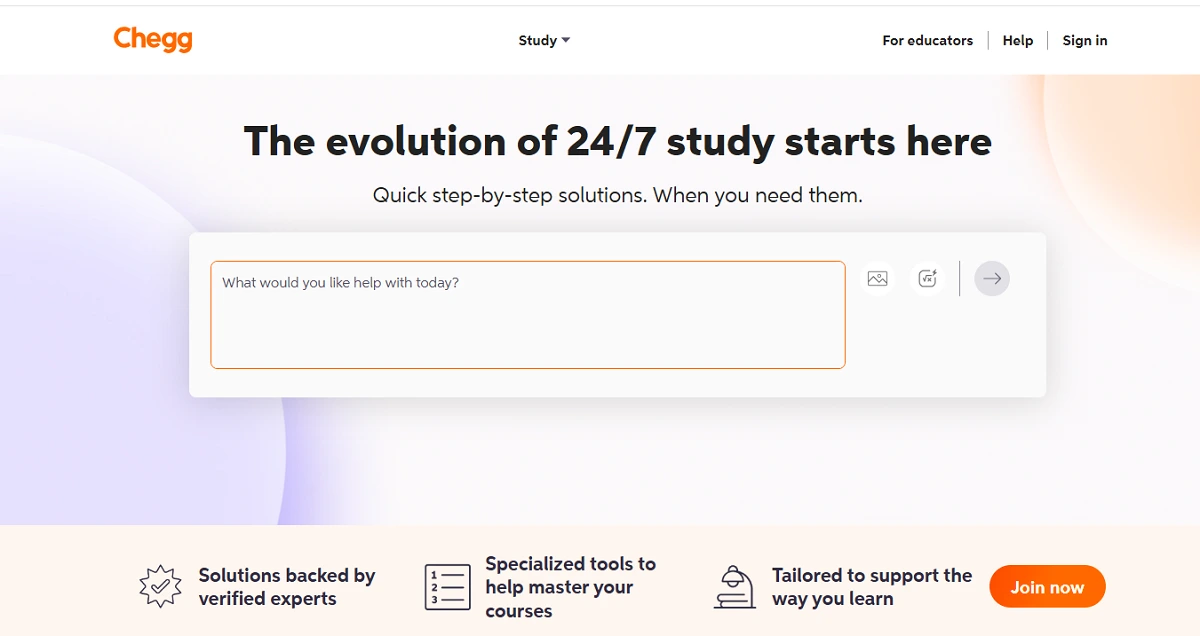
Chegg is perhaps the most well-known homework help service and a direct competitor to Bartleby. Chegg Study, like Bartleby, provides step-by-step textbook solutions and an expert Q&A feature. Chegg has a massive library of solved textbook problems (millions of solutions, comparable in scale to Bartleby’s library) and allows subscribers to ask their own homework questions to experts 24/7. Chegg’s monthly subscription (called Chegg Study Pack) is around $19.95 per month for the full package, which includes textbook solutions, expert Q&A, a plagiarism checker, and other tools. Chegg also offers separate services: for example, Chegg Study (homework help only) for about $15/month, and Chegg Writing (similar to Bartleby Write) for about $10/month – or bundled together in the Study Pack. Students often choose Chegg for its long-standing reputation and extensive content. In terms of quality, Chegg has a large network of verified experts and often provides fast responses. However, Chegg’s subscription is a bit pricier than Bartleby’s base plan, and Chegg has a limit on the number of questions you can ask per month (typically 20 questions on Chegg Study). If you found Bartleby’s answer quality lacking or need even more breadth of textbook solutions, Chegg is a solid alternative. Just keep an eye on the cost, since adding all of Chegg’s features can add up. Also, Chegg has recently been integrating AI (with their CheggMate initiative) to enhance homework help, which might appeal to students looking for the latest tech in study support.
Course Hero

Course Hero is another popular platform for study support, but it works a bit differently. Course Hero is built around a huge library of user-contributed study documents – lecture notes, past exams, textbook solution PDFs, etc. Students can search millions of documents for help on specific topics or questions. Course Hero also has a 24/7 tutor Q&A service where you can submit questions and get explanations from verified educators (usually within a few hours). Instead of a flat monthly subscription for unlimited access, Course Hero operates on a credit system: you either subscribe (around $20/month billed annually, or about $40 month-to-month) which gives a certain number of unlocks and questions, or you can earn free unlocks by uploading your own study materials. Many students use Course Hero as an alternative or complement to Bartleby to find solved problems or study guides for their exact class, which Bartleby might not have. The strength of Course Hero is the sheer volume of material – if your exact homework problem has been uploaded by someone, you’ll find it there. The downside is quality control: solutions on Course Hero aren’t always verified or step-by-step; they might just be an image of someone’s work. For thorough, explained solutions, Bartleby or Chegg might be better. But if you need a specific assignment or want a variety of reference materials (like essays or lab reports), Course Hero is a powerful alternative. It’s also worth noting that Course Hero, like Bartleby, now falls under the same parent company Learneo (since 2023), though they continue to operate as separate services with different models.
Quizlet
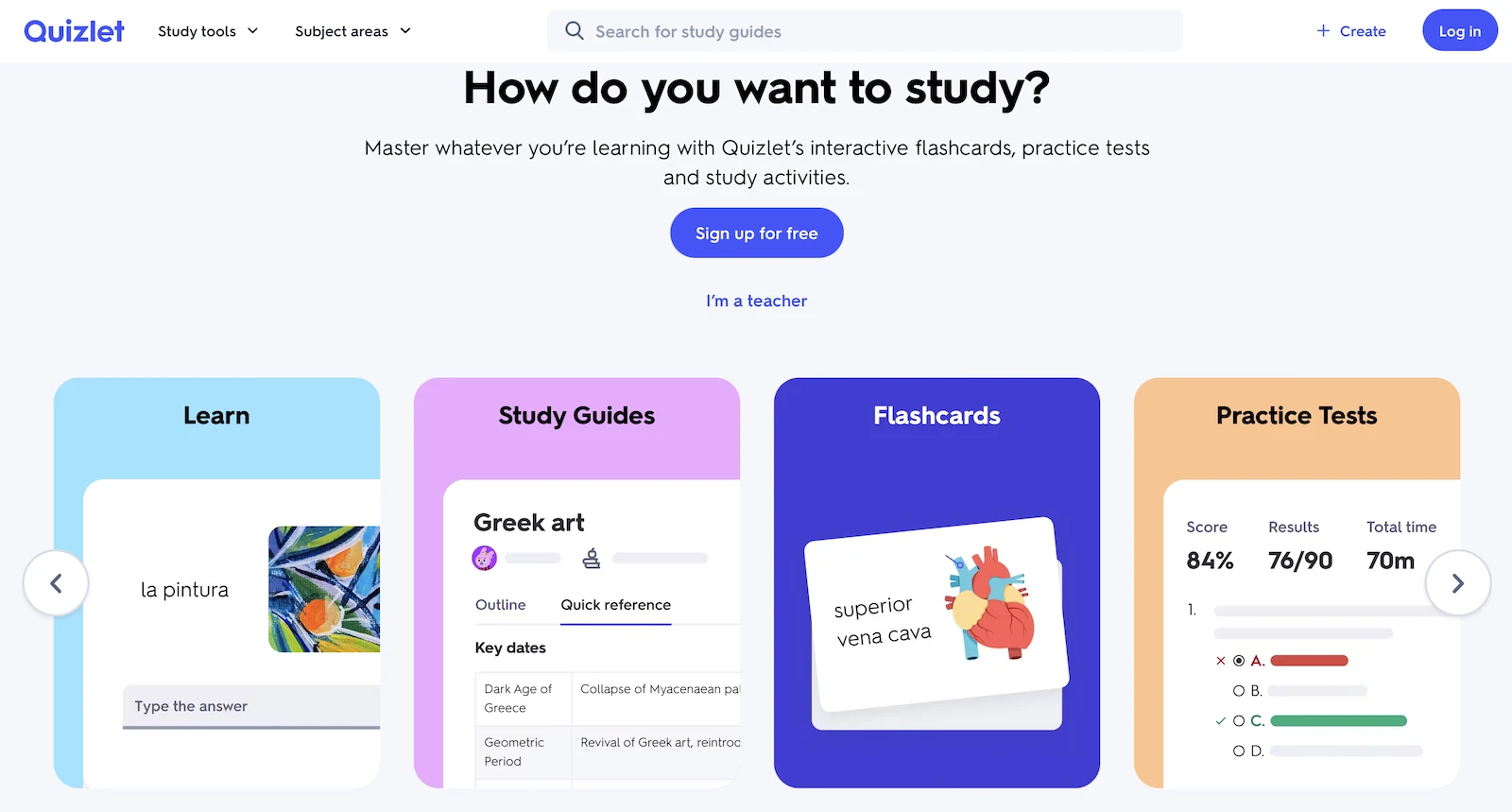
Quizlet is a well-known study app that originally focused on flashcards and memorization, but it has expanded some features that overlap with Bartleby. Quizlet has an extensive database of textbook solutions (since acquiring Slader.com). With a Quizlet Plus subscription (about $48 per year, roughly $4 per month), students can access step-by-step solutions for textbooks and practice problems. Quizlet’s forte is still in helping you learn via flashcards, quizzes, and games, which makes it a bit different from Bartleby’s Q&A approach. However, if your main need is reviewing concepts (like preparing for exams or learning vocabulary, formulas, etc.), Quizlet is an excellent alternative. It’s also much cheaper than Bartleby if paid annually, and it offers a free tier which allows access to a limited number of solutions and all user-generated flashcard content. Quizlet doesn’t provide on-demand expert help where you ask new questions – it focuses on existing content and learning tools. So unlike Bartleby, you can’t submit a totally new homework question to Quizlet’s experts. But for many standard textbooks in math, science, engineering, etc., Quizlet likely has detailed solutions available that you can study from. Think of Quizlet as a more interactive, study-method-based alternative: flashcards for memorization, learn modes, and a community sharing knowledge. It pairs well with something like Bartleby or Chegg, but by itself Quizlet is great for self-study and reviewing material in an active way.
Brainly
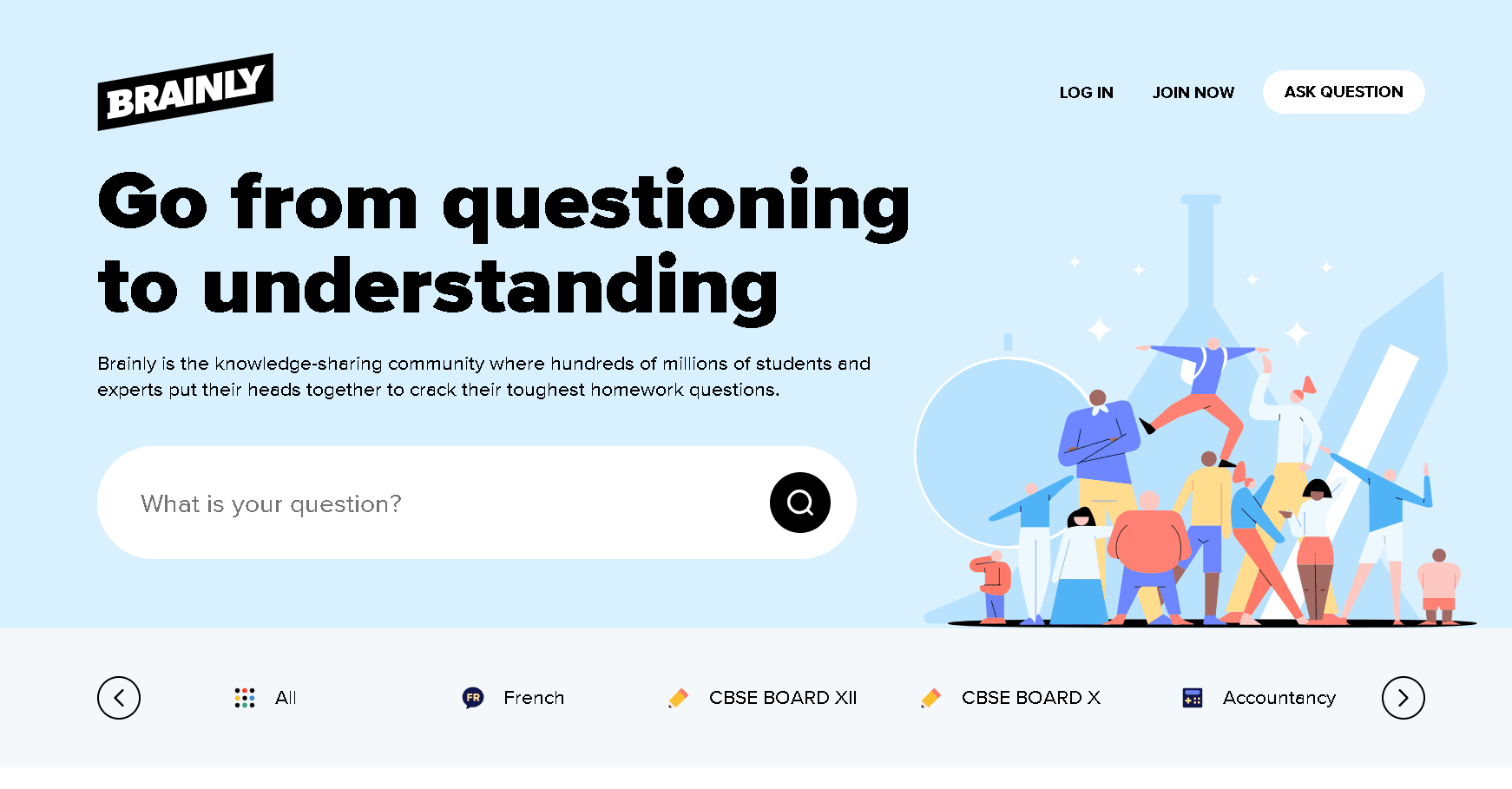
Brainly offers a crowdsourced approach to homework help. It’s a free Q&A platform where students post questions and other students or subject enthusiasts answer them. Brainly has a huge user base worldwide, making it a go-to for many high school and college students looking for quick answers without paying. If you’re considering alternatives because of budget, Brainly is worth a look – the basic usage is free (supported by ads). Users can post a limited number of questions and usually get answers fairly quickly, especially for popular subjects like math, science, or history. Brainly also offers a premium subscription (~$24 for 6 months, as an example) which removes ads, gives you priority answers, and allows unlimited question posts. As an alternative to Bartleby, Brainly’s advantage is cost (free or very low cost) and the community aspect. However, the quality of answers on Brainly can be hit-or-miss. Some answers are excellent and thorough, while others might be incomplete or incorrect, since they come from peers. Bartleby’s answers, in contrast, are from paid experts and subject to quality control. Additionally, Brainly doesn’t have extra services like a writing help tool or a guaranteed pool of expert staff – it relies on volunteers or students helping each other. In summary, if you can’t afford Bartleby or Chegg, Brainly is a decent free alternative for quick homework Q&A, but use caution and double-check the answers you get.
Khan Academy
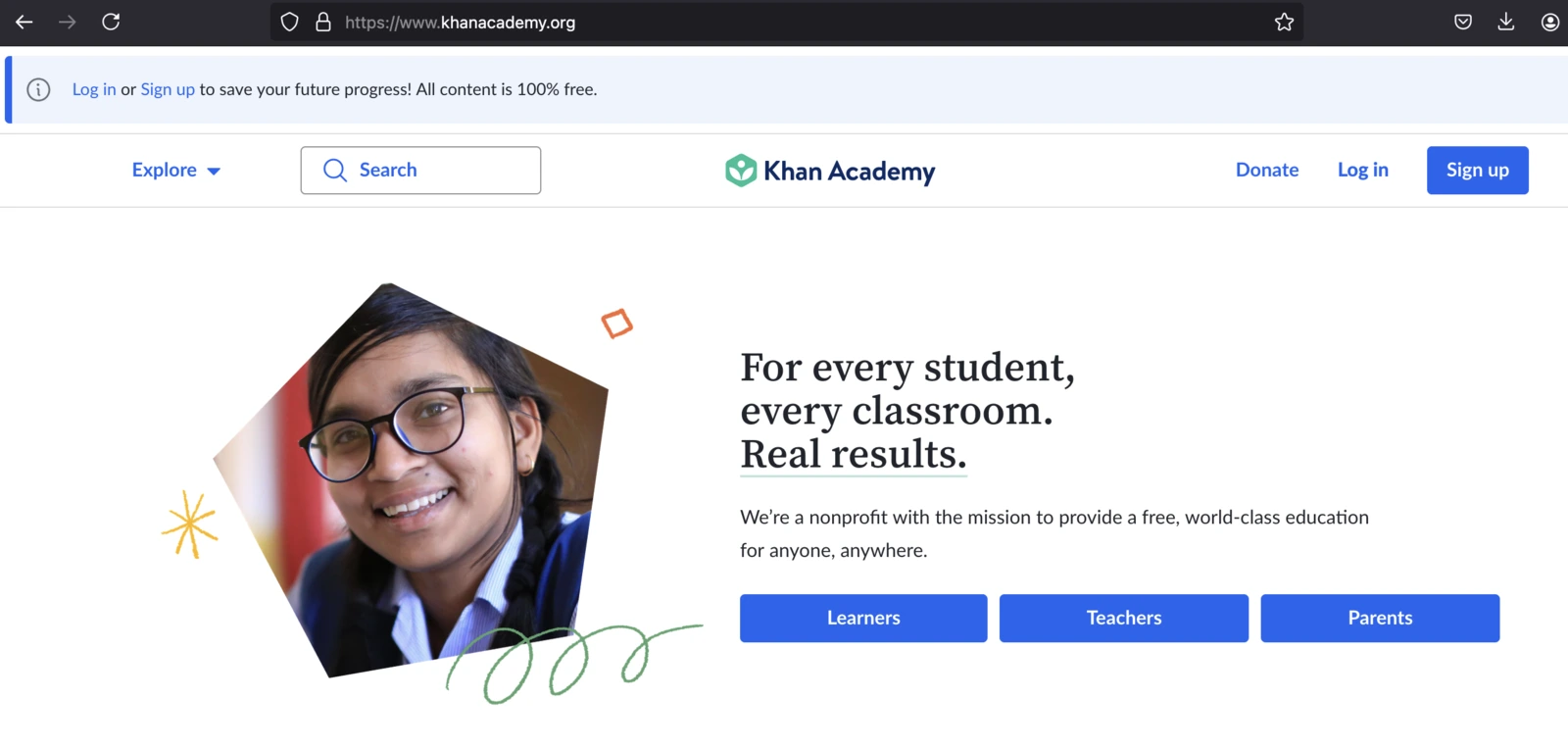
Khan Academy is a nonprofit educational platform rather than a direct Q&A service, but it’s an invaluable resource for students who want to learn concepts for free. We mention Khan Academy as an “alternative” in the sense that some students turn to it when they find themselves struggling with theory or fundamentals that a solution explanation alone can’t fix. Khan Academy offers free video lessons and practice exercises in math, science, engineering, economics, and more. If Bartleby’s step-by-step solution isn’t enough and you realize you need to really learn the underlying concept, Khan Academy’s tutorials are a great supplement. For example, if you keep using Bartleby to get answers for calculus problems but feel lost on exams, you might spend time on Khan Academy’s calculus course to strengthen your understanding. While Khan Academy doesn’t provide direct help on your specific homework questions, it can teach you how to solve them yourself. There is no cost at all, and no login required to access the lessons. The downside is, of course, it’s not on-demand personalized help – you have to find the relevant topic and work through the educational materials. In summary, Khan Academy is a fantastic free resource for learning and reviewing concepts in a structured way. Many students use it alongside a homework help subscription: Bartleby (or Chegg, etc.) for quick answers, and Khan Academy for learning the material deeply. Parents in particular appreciate Khan Academy as a safe, high-quality learning tool to support their children’s education without additional cost.
My Engineering Buddy
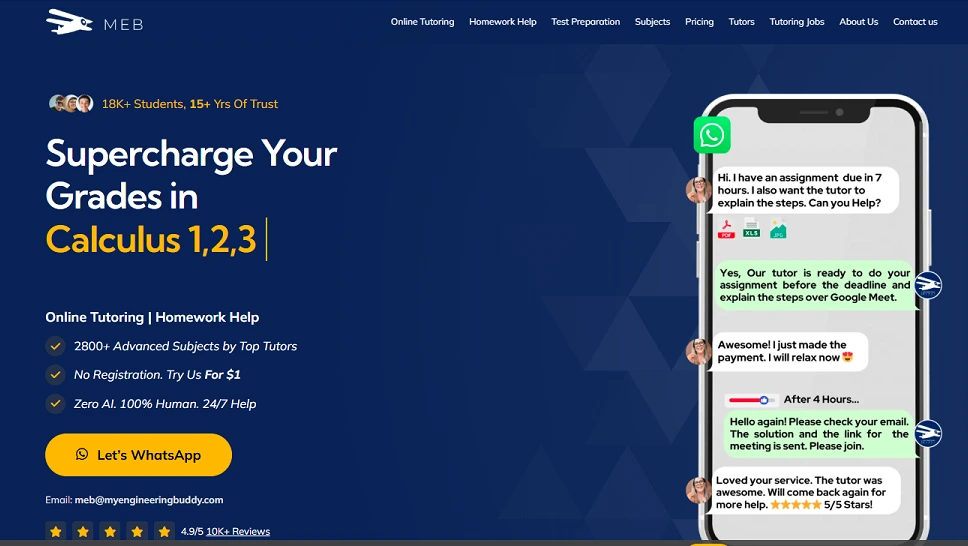
My Engineering Buddy is a specialized tutoring and homework assistance service, focused primarily on engineering and technical subjects. It’s an excellent alternative for students who need more personalized, expert help in complex STEM courses. Unlike Bartleby’s subscription model, My Engineering Buddy operates on a pay-as-you-go or on-demand tutoring basis. Students can connect with real human tutors (often professional engineers or subject matter experts) to get one-on-one help on assignments, projects, or exam prep. One key advantage of My Engineering Buddy is that it caters to challenging college-level engineering problems that generic platforms might not handle well. For example, if you’re struggling with a difficult civil engineering problem or an advanced math proof, My Engineering Buddy will pair you with a tutor who can walk you through the solution step by step in a live session or provide a detailed written solution as needed. This is a more customized approach compared to Bartleby’s general pool of experts answering questions asynchronously.
Students often choose My Engineering Buddy for its high-quality, personalized support. The tutors are known to be patient and thorough, often providing in-depth explanations rather than just giving the answer. You aren’t tied to a monthly fee – you simply pay for the help you need, when you need it. This can be more economical if you only occasionally need help on very tough problems (since Bartleby might not justify a constant subscription in that case). My Engineering Buddy has built a positive reputation especially in the engineering student community; users report that the service is responsive and that tutors can handle subjects ranging from mechanical and electrical engineering to advanced calculus and programming. Essentially, it’s like having a personal study buddy who’s an expert in the field, ready when you’re stuck.
While My Engineering Buddy may not cover every subject (it’s focused on STEM and particularly engineering, as the name suggests), it outshines general services when it comes to those difficult technical courses. There’s also an element of trust and accountability – you often get the same tutor or can request a tutor you like, building a rapport, something impossible on large anonymous platforms. If Bartleby’s impersonal answer database isn’t meeting your needs or you want guided tutoring by a human for a challenging class, My Engineering Buddy is a top alternative to consider. It complements or even replaces services like Bartleby by offering a more human touch and flexible pay-for-what-you-need pricing, which many students and parents from the US, UK, Gulf countries, and Australia find valuable for rigorous academic subjects.
How it Works?
For Students
Using Bartleby as a student is straightforward. First, you choose the plan you want (homework help, writing help, or both) and create an account. Once subscribed, you can log in to the Bartleby website or mobile app and immediately start accessing its tools. For homework problems, you have a few options:
- Search for textbook solutions: Bartleby Learn lets you search a database of over 5 million step-by-step solutions. Typically, you enter the textbook name or ISBN, then navigate to the chapter and problem number, or you can search by keywords from the question. If a solution is available, you’ll see a detailed explanation written by an expert. This is helpful for checking your work or getting unstuck on practice problems.
- Ask an expert your question: If you have a homework question that isn’t already solved in the library, you can use your “ask a question” feature. You’ll type out your question (and you can attach a photo of the problem for clarity) and submit it to Bartleby’s experts. An expert will then write a solution explanation for you, usually within a few hours. The answer is posted to your account and also added to the Bartleby library for others. Remember, depending on your plan, you may have a limit on how many questions you can ask per month (for example, 5 with the standard plan, more if you upgrade). Unused question credits typically do not roll over, so students tend to use them wisely on their toughest problems.
- Use the math solver and other tools: Bartleby’s app has a feature where you can snap a photo of a math equation and get a step-by-step solution (similar to services like Photomath). This is handy for quick checks on algebra or calculus problems. The math solver is included with the subscription and can handle many equations instantly.
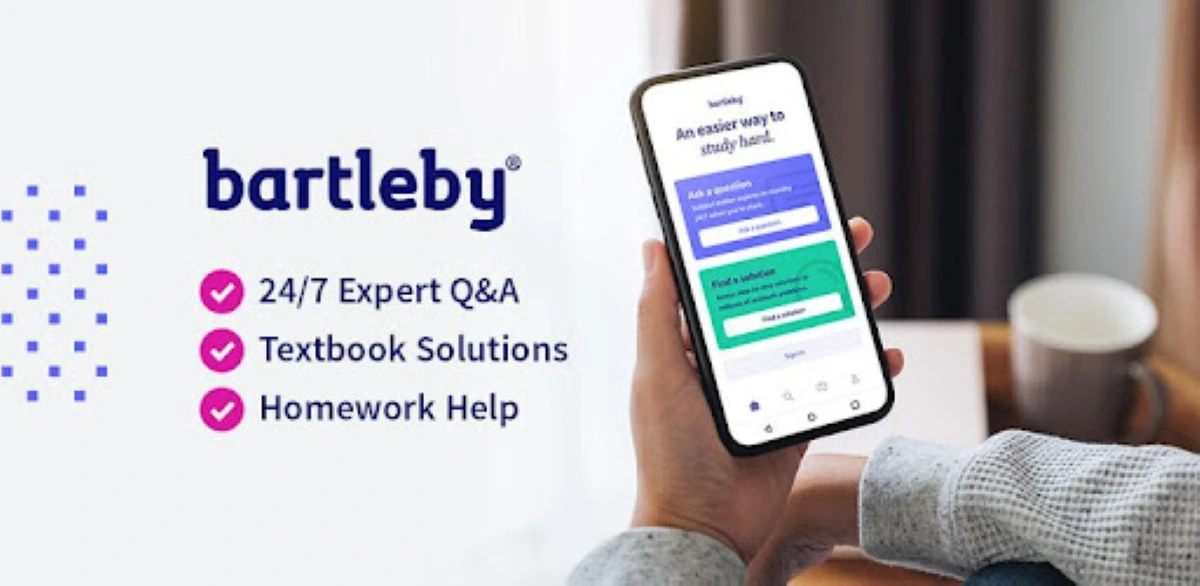
- Writing help: If you subscribed to Bartleby Write (or Bartleby Plus), you have access to a suite of writing assistance tools. For example, you can copy-paste your essay draft into the Bartleby writing editor. It will highlight grammar mistakes, suggest rephrasing for clarity, check spelling, and even flag potential plagiarism by comparing against online sources. There’s also a citation generator to help you format references in APA, MLA, etc. Students typically use these tools before submitting papers to catch errors and improve their writing quality.
- Live tutoring (optional): If you need more help than what a written solution provides, Bartleby Tutor is available. As a student, you can request a live tutoring session on-demand. You’ll select the subject and connect to a tutor via chat or audio. This isn’t included in the standard subscription – you pay per session. But it’s very flexible: for example, at 11 PM before an exam, you could start a 30-minute chat with a tutor to clarify last-minute doubts in physics. The interface lets you exchange messages and images (like you can snap a photo of your work for the tutor to see). Students have found the 24/7 availability useful – there’s always a tutor on duty in popular subjects.
From a student’s perspective, Bartleby works as a multi-purpose study aid. You log in, and you have a toolbox: a search bar for solutions, an ask feature for new questions, and tabs for writing help. It’s self-service and available anytime. One important thing is that Bartleby is meant to aid learning, not just be a shortcut – the solutions are detailed so you can follow the reasoning. To get the most out of it, you’d use the solutions to learn how to solve similar problems on your own. Also, keep track of your billing if you only need it for a short time (you might subscribe during midterms or finals and then cancel, for example). Cancelling is done through your account settings or by emailing customer support, and once you cancel, you’ll still have access until your paid period ends.
For Tutors
Bartleby also engages tutors and Subject Matter Experts (SMEs) who provide the answers and tutoring for students. If you’re interested in working as a tutor on Bartleby, here is how it works:

- Application and qualification: Tutors (SMEs) must apply through the Bartleby experts portal. You’ll need to have at least a bachelor’s degree in the subject you want to answer questions in (they verify your credentials). The application process includes subject tests – typically a multiple-choice test on key concepts, and a sample written solution test. For example, if you want to be a Calculus expert, you’ll solve some calculus problems to demonstrate your skills. You might also undergo a brief background check. It usually takes 1-2 weeks to hear back after applying
- Working as a Q&A expert: Once approved, you gain access to Bartleby’s expert platform. Here you can see a list of student-submitted questions in the subjects you qualified for. You choose questions to answer – it’s a very flexible, pick-what-you-can system. For each question you answer correctly and thoroughly, you earn a set amount of money. The pay rate per question can vary depending on the subject and difficulty. For instance, very simple questions might pay a couple of dollars, while complex ones can pay more. (One source noted rates ranging roughly from $0.50 up to $25+ per question depending on complexity and subject, with advanced subjects paying more) Bartleby discloses your exact pay rate when you join, in a contract letter. Tutors from different regions may see different rates (e.g., there are many experts from various countries). Bartleby pays experts monthly, typically via bank transfer, for all the answers they provided that were accepted.
- Live tutoring sessions: Some Bartleby experts can also take live tutoring requests (Bartleby Tutor). In this role, you would be pinged when a student requests a session in your subject, and you conduct a chat or audio session for the allotted time. The pay for live tutoring is usually proportional to the session length. As noted earlier, students are charged $0.50 per minute (e.g. $30/hour). Tutors typically receive a portion of that fee – the exact split isn’t public, but companies often give tutors something like 50-80% of the student fee. So a tutor might earn on the order of ~$15-$20 for a 1-hour session. The tutor platform allows you to indicate when you’re available for live sessions.
- Flexibility and workload: Being a Bartleby tutor is a part-time, freelance role. There is no minimum or maximum number of hours – you can answer one question a day, or twenty, depending on your free time and the question volume. Many tutors log in during evening hours (when a lot of US students are doing homework) to answer questions. The workload also depends on your subject’s demand; subjects like math, physics, and accounting tend to have many questions daily, whereas niche subjects might have fewer.
Now, let’s address some common FAQs from the tutor perspective:
- Can tutors set up their own fee? – No, tutors cannot set their own prices on Bartleby. All fees are pre-determined by Bartleby’s system. The pay rate per answer is fixed by subject and question type, and live session rates are also standardized (students pay fixed session prices). This means as a tutor, you can’t negotiate how much a particular question is worth; you’ll know the rate when you pick the question.
- How much can tutors earn per hour? – Earnings can vary. For Q&A experts, it depends on how fast you can answer questions and the rates of those questions. Some experienced tutors might answer several questions in an hour. If each question paid, say, $3 and you answered 5 in an hour, that’s $15/hour. For live tutoring, as mentioned, the student is charged $30 for an hour session, so the tutor’s portion might be around that range (perhaps slightly less if the platform takes a cut). In practice, tutors report that the pay is decent for a side gig, but not extremely high; one analysis noted Bartleby’s pay per question could be about 40% lower than Chegg’s in some subject. So a tutor might earn a few hundred dollars a month if they consistently answer questions daily. It’s a nice way to earn extra money, but it may not replace a full-time salary in most cases.
- How many hours per month can one work? – There’s effectively no formal cap on hours; you can put in as many hours as you want. Some tutors treat it like a full 20-hour per week part-time job, especially during homework-heavy seasons. Others just hop on occasionally. Keep in mind, the availability of questions or students seeking help can limit your hours – if there are no new questions, you can’t answer anything. But Bartleby’s user base is large, so for common subjects, there’s almost always some question waiting to be solved. You have the freedom to work from home and choose your own schedule.
- Is it easy to get students (questions to answer)? – If you’re in a high-demand subject like calculus, statistics, or chemistry, you’ll usually find plenty of questions to answer, especially during the academic year. The system might have many experts, so sometimes questions get snapped up quickly. New tutors might find it a bit slow until they learn the platform and respond speedily. For live tutoring, getting students depends on how many requests come in and if you’re online to accept them. Bartleby routes the request to available tutors; being prompt and having good ratings can help you get chosen. Overall, there is steady demand, but it can fluctuate. Mid-terms and finals periods are often very busy (lots of questions), whereas during holidays or summer it might be quieter.
- Tips to get more students or questions? – Top Bartleby tutors suggest maintaining a high answer quality and a fast response time. If your answers consistently get good feedback (students can presumably rate or the staff reviews correctness), you might get priority or at least you build a personal good reputation. Also, being available at peak times (typically afternoon and evening in U.S. time zones) will expose you to more questions. For live tutoring, having a profile with your expertise listed and logging in frequently can increase your chances of getting sessions. There isn’t much self-promotion involved since Bartleby doesn’t have a public tutor directory; the system matches students to experts. Thus, the “tips” boil down to: be reliable, accurate, and quick, and the system will naturally feed you more opportunities.
- What do tutors like about Bartleby? – Many tutors appreciate the flexibility. You can work from anywhere, at any time, which is perfect for grad students or professionals doing this on the side. The platform provides a steady stream of diverse questions, which can be intellectually rewarding if you enjoy teaching or solving problems. Tutors also like helping students achieve “aha” moments. Payment is monthly and generally on time, and you don’t have to do any marketing to find students – Bartleby brings them to you. The ability to choose which questions to answer means you can skip ones you’re not comfortable with.
- What do tutors dislike? – Some common complaints include the pay rates being somewhat low for the effort on complex problem. For example, a very challenging physics problem might pay the same as a simpler one, so tutors sometimes feel undercompensated on tough tasks. The platform can also be competitive – if many experts are online, you might see questions disappear quickly as someone else grabs them. In the past, there have been instances of tutors mentioning delayed communication from the company or sudden changes in available work (for instance, after the Learneo acquisition, there were reports of organizational changes). Additionally, dealing with occasional unclear or incomplete questions from students can be frustrating (you might spend time solving something only to find the student had a typo in the question). Finally, customer support for experts is somewhat slow (mostly email-based). Despite these issues, many tutors still find Bartleby a convenient way to earn extra income and help students.
Overall, Bartleby’s system for tutors is designed to ensure students get fast, correct answers, while giving educators an opportunity to earn money flexibly. It’s a two-sided platform: students ask questions on one end, tutors answer on the other. Both sides benefit when it works smoothly – students learn, and tutors earn.
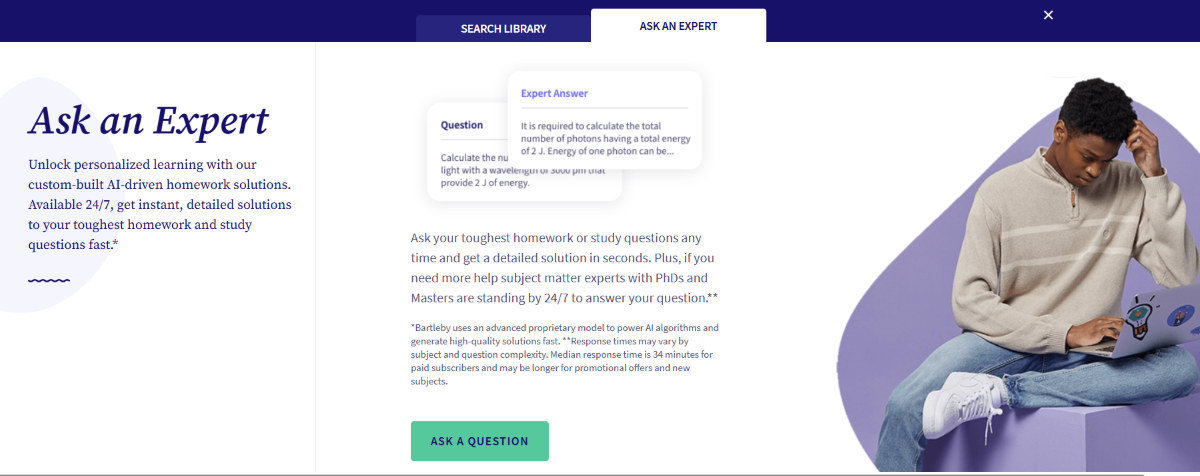
Bartleby Company Information
Bartleby is a relatively new entrant in the education technology space, but it has roots in older educational content. The service was launched in 2017 by Barnes & Noble Education, Inc. as part of their Digital Student Solutions initiative. Barnes & Noble Education (BNED) created Bartleby to provide online study support for college students, leveraging the famous bartleby.com domain (which historically was a site for literary references and study texts). In its current form, Bartleby’s mission is to be “your guide to better learning,” aiming to help students get their homework done faster and learn more effectively. The name “Bartleby” is a nod to the literary character Bartleby the Scrivener, but in this context it has become a brand for academic help.
Originally, Bartleby started as a subscription textbook solution and Q&A platform (similar to Chegg). Over time it expanded to include writing tools and tutoring. In 2023, a major development occurred: Bartleby was acquired by Learneo, Inc., a parent company that also owns Course Hero, CliffsNotes, QuillBot, and other education services. This acquisition came as Barnes & Noble Education sold off its digital student businesses. Under Learneo, Bartleby is now a sister company to Course Hero and is part of a larger family of learning tools. Bartleby’s headquarters is listed in Redwood City, California (which not coincidentally is where Course Hero is based), and as of 2025 Bartleby operates with a team of perhaps a few hundred employees worldwide.
In terms of scale, Bartleby has a significant reach. It boasts over 5 million textbook and homework solutions in its database, covering dozens of subjects. It has served millions of students (exact user numbers aren’t public, but considering the number of reviews and the fact that it’s integrated into many campus bookstore offerings, the user base is large). Bartleby’s services are used mainly in English-speaking countries like the United States, UK, Canada, Australia, as well as by international students studying in those curricula. The platform supports content in English primarily, but thanks to being part of Learneo, it may offer some tools in other languages (Learneo also owns LanguageTool and other multilingual tools). At its core, though, Bartleby’s focus is U.S. college and high school curriculum assistance.
Bartleby’s offerings can be summarized in four main product lines
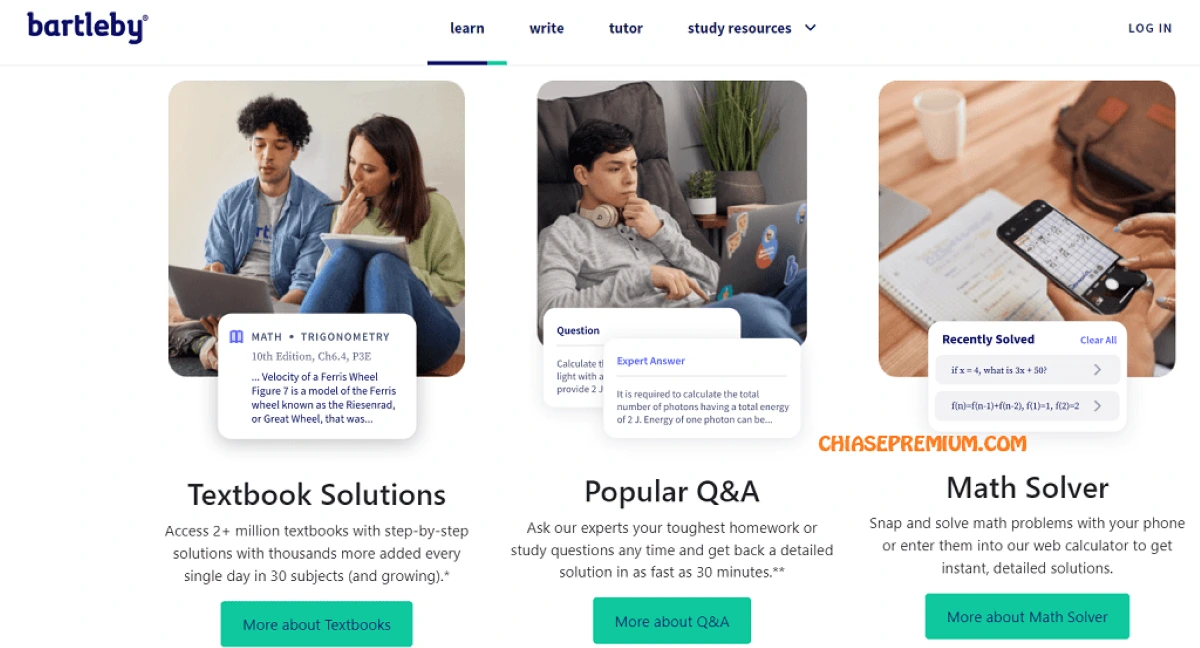
- Bartleby Learn: The homework help service – textbook solutions and expert Q&A for subjects across math, science, engineering, business, social sciences, and more.
- Bartleby Write: The writing help service – AI-based tools for proofreading, plagiarism checking, and citation assistance to improve students’ writing.
- Bartleby Plus: A combined package that gives users both Learn and Write features (and access to any new tools) in one subscription
- Bartleby Tutor: The on-demand tutoring marketplace – live 1:1 tutoring sessions by expert tutors in various subjects, available 24/7
Subjects offered by Bartleby are extensive. For academic homework help, Bartleby covers over 30 subjects at the high school and college level. This includes all the major STEM fields (various levels of Math from Algebra to Calculus, Statistics, Physics, Chemistry, Biology, Engineering disciplines like Mechanical, Electrical, Civil, Computer Science, etc.), business subjects (Accounting, Finance, Economics, Management, Marketing), and some humanities and social sciences (History, Psychology, Sociology, etc.). Essentially, if it’s a subject with structured problems or essays in a standard curriculum, Bartleby aims to support it. The unique features Bartleby offers – like its math solver in the app, or the AI essay scoring – are part of its strategy to stand out from competitors by not just answering questions, but also actively helping students improve their skills.
USP of Bartleby
Bartleby’s Unique Selling Proposition (USP) lies in its all-in-one approach to student support. Many competitors specialize either in homework Q&A (for example, Chegg) or in writing help (for example, Grammarly), but Bartleby combines multiple services under one roof. A student can get step-by-step solutions for a calculus problem, then switch to getting their English essay checked for grammar and plagiarism, all on the same platform. This convenience is a big draw – it’s essentially a “one-stop shop” for study needs. Bartleby emphasizes making study more efficient: “an easier way to study hard” as their tagline says. With 24/7 availability, a student stuck at midnight can still get help. Another aspect of Bartleby’s USP is its integration of technology with human expertise. The platform leverages a vast digital content library and AI tools, but also provides access to human experts when needed, striking a balance between automated help and personalized help.
Moreover, Bartleby has a close relationship with educational institutions through Barnes & Noble College bookstores. Many students first hear of Bartleby when renting textbooks or shopping for course materials, as it’s offered as an add-on. This integration into the student ecosystem is part of its unique positioning – it’s not just a standalone website, but often presented as an official study aid connected to their college bookstore. Finally, Bartleby’s pricing (especially Bartleby Plus) being lower than buying multiple separate services is a selling point, as noted earlier. Getting homework and writing help together for one moderate price is a value proposition that sets it apart.
Drawbacks of Bartleby
No service is perfect, and Bartleby has its share of drawbacks. Based on user experiences and reviews, here are some of the key weaknesses:
- Customer service and billing issues: The most glaring drawback, as highlighted by many reviews, is Bartleby’s problematic cancellation and billing practices. Students have found it difficult to cancel subscriptions at times, or reported being billed even after cancellation attempts. The lack of immediate live customer support (no instant chat for issues; you typically have to email) can make resolving these issues slow. This has understandably frustrated users.
- Limited questions in base plan: The cap on how many new questions you can ask experts (for example, 5 per month on the standard plan) is a limitation for heavy users. If you have a lot of doubts or assignments, you might quickly exhaust your questions. Competitors like Kunduz offer plans with unlimited questions, so Bartleby’s limit can be seen as a downside. Though you can pay more for tutoring, that’s not always economically feasible for students on a tight budget.
- Answer quality variability: While many Bartleby answers are high quality, there have been instances of incorrect or insufficient answers (this is true of any homework help service – no expert network is 100% error-free). If a student gets a wrong solution, it can be harmful. Bartleby does allow you to report solutions that are wrong to hopefully get a correction, but that takes time. Some students prefer to double-check Bartleby answers with other sources for this reason.
- Lack of subject breadth in tutoring: Bartleby’s live tutoring, while available, is not as widely known or robust as dedicated tutoring platforms. The subjects offered for live tutoring might be fewer or have fewer tutors available at a given moment (for example, they may have lots of math tutors ready, but if you needed a tutor for a very niche subject at 3 AM, you might not find one). The primary focus of Bartleby is still on the Q&A and solutions library, so as a tutoring service it’s not yet a leader.
- Possible academic integrity concerns: Some educators worry that students might misuse Bartleby to copy answers without learning. This isn’t unique to Bartleby (Chegg and others have the same issue), but it’s worth noting. Students need discipline to use the service as a learning tool rather than a cheating shortcut. Bartleby’s existence has even led some professors to change how they assign homework. From a student perspective, this means you have to be cautious – if you submit Bartleby solutions verbatim, you could get in trouble if caught. Bartleby does include honor code warnings in its terms, but enforcement is up to schools.
In summary, Bartleby’s drawbacks center around service execution and limitations, not the concept itself. It clearly helps many students, but improvements in customer support, more generous question allowances, and continuous quality control would address many of the common complaints. When considering Bartleby, students just need to be aware of these issues: cancel proactively when done, don’t expect unlimited personal help unless you pay extra, and use the solutions wisely.
Comparison with My Engineering Buddy
Let’s compare Bartleby with one of its notable alternatives we discussed, My Engineering Buddy (MEB), to see how they stack up:
- Services and Scope: Bartleby is a broad platform covering many subjects (from literature to math to engineering) and emphasizes self-service solutions and tools. My Engineering Buddy is specialized, focusing mainly on engineering and related technical subjects. MEB offers very hands-on help (tutoring, detailed solutions on request) for those fields. If you’re an engineering student, MEB zeroes in on exactly your area, whereas Bartleby will have engineering content but also lots of other subjects. The specialization of MEB can mean higher quality help for complex engineering problems, since their tutors are likely experts in those specific areas.
- Help Format: Bartleby primarily gives written solutions and explanations through its Q&A system. It does have live tutoring, but it’s an add-on. My Engineering Buddy, on the other hand, is heavily oriented toward live or on-demand personal help. With MEB, you often interact directly with a tutor who works through your problem or teaches you one-on-one. This means if you need a conversational, iterative approach to understand a tough concept, MEB provides that. Bartleby’s model is more like “ask a question, get an answer” without back-and-forth (unless you initiate a whole new tutoring session). For students who prefer personal interaction, MEB has an edge; for those who like having a written solution to refer to, Bartleby’s format is convenient.
- Pricing Model: Bartleby uses fixed-price subscriptions (plus fixed fees for optional tutoring). You pay a flat monthly rate and use the service as much as allowed. My Engineering Buddy usually uses a pay-as-you-go model – you might pay per question or per hour of tutoring. This can be beneficial if you only occasionally need help, as you’re not paying continuously when you don’t need the service. For example, a student might use MEB only during a particularly hard assignment and pay just for that help, whereas Bartleby subscribers pay every month even if they only needed serious help a couple times. On the flip side, if you need daily help across multiple subjects, Bartleby’s subscription could be more economical.
- Quality and Personalization: Because MEB provides tutors who work closely with you, the help is highly personalized. You can ask follow-up questions, get the tutor to adjust to your pace, and so on. Bartleby’s answers are general explanations that assume a generic student reader. Also, MEB’s tutors likely take more time per student (since it’s one-on-one), whereas Bartleby’s experts are answering lots of students so they might not go beyond what was asked. For tough engineering courses, that personalized guidance can make a big difference in understanding. Many students feel that MEB’s help is akin to having a knowledgeable friend or personal coach, which can build confidence and deeper comprehension. Bartleby might feel more transactional – you got an answer, but if you didn’t fully get it, you’d have to figure it out or pay for a tutoring session.
- Speed and Availability: Bartleby has the advantage of a large pool of experts and an existing solution library, so you often get instant gratification: either the solution is already there, or an expert answers within a few hours. My Engineering Buddy, being more manual in approach, might require scheduling or at least waiting to be matched with a tutor (though they do try to be quick). If you have a deadline in one hour, Bartleby’s database might save you, whereas getting a tutor on MEB in that exact moment could be less certain. That said, MEB is known to be quite responsive – they often advertise quick turnaround for urgent homework help – but it’s something to consider.
- Global Reach: Bartleby, as part of a large ed-tech company, has a global user base and a brand name behind it. My Engineering Buddy is a more boutique service, likely with a smaller team of expert tutors. MEB is very popular among certain circles (especially engineering students who found mainstream services lacking for their needs). It might not have the slick app or massive marketing, but it often wins customers by word-of-mouth due to successful help provided. For parents and students in wealthy countries, Bartleby might be the name they see advertised, but those who dig deeper often find MEB as a “hidden gem” for tough subjects.
In conclusion of the comparison, neither is objectively “better” in all aspects – it depends on the student’s needs. If someone wants a wide range of subjects, lots of existing solutions, and a fixed low cost, Bartleby is very convenient. If someone specifically needs high-level engineering help or prefers personal guidance, My Engineering Buddy is superior in that niche. Many students actually use both: they might use Bartleby or Chegg for quick answers in easier classes, and turn to My Engineering Buddy when faced with a particularly challenging project or when they want to ensure they truly grasp an engineering concept. Importantly, My Engineering Buddy stands out as a strong alternative because of its focus on quality and personal tutoring, filling the gaps where Bartleby might not provide enough depth or interaction.
Customer Support and Policies
Bartleby’s customer support is an area that has room for improvement. Currently, Bartleby provides support primarily via email (customercare@bartleby.com) or through a web contact form. They do not have a public phone number for student support, and live chat support is not prominently available. This means if you have an issue – say, a billing problem or a technical glitch – you usually have to send an email and wait for a response. According to user reports, response times can vary; some get a reply within a day, others have waited several days. As noted earlier, the lack of instant support has been a con (students dealing with urgent billing issues have felt frustrated by the slow back-and-forth). Bartleby’s help center (FAQ site) does have self-service articles addressing common questions (like how to cancel, how to use features, etc.), which can be useful for quick guidance.
When it comes to policies, Bartleby’s terms of service outline the subscription billing practices (auto-renewal, no refunds except the guarantee), and an academic integrity policy. They explicitly state that the content provided is for study purposes and students should not plagiarize solutions. In fact, Bartleby has an honor code that users agree to, which basically says: don’t use our answers to cheat on assignments or exams. Of course, enforcement of this is outside Bartleby’s scope – it’s more about giving them a disclaimer. In practice, students should be mindful of their own school’s honor code when using any solution service.
On privacy, Bartleby’s policies comply with standard data protections; they don’t sell personal info, etc., and they allow account deletion requests. Because Bartleby is used by minors as well (some high schoolers use it), they likely adhere to COPPA and other regulations for younger users. There haven’t been any notable data breaches or scandals regarding Bartleby’s handling of data to date.
As for cancellations and refunds, we covered that in the pricing section: the official policy is no refund except one-time satisfaction guarantee. To cancel, a user should log in and cancel through the account page (under your subscription settings) – this ensures it stops the next renewal. There have been reports that some students didn’t find the cancel button easily, so alternatively you can email the support to request cancellation (and they will cancel from their end). It’s always a good idea to save any confirmation emails of cancellation, just in case.
In summary, Bartleby’s customer support is functional but not exceptional. It’s something to be aware of: if you ever have an issue, you won’t have an immediate phone or chat resolution, but rather a support ticket system. For many users, they never need support and things go smoothly. But if you’re someone who values strong customer service, this is a point where Bartleby could improve. Comparatively, a service like My Engineering Buddy might offer more personalized attention (since it’s smaller scale, you might be directly communicating with a service manager or tutor if something’s wrong). Bartleby, being large, is a bit more impersonal in support approach.
Global Reach and Localization
Bartleby primarily serves an international audience of English-speaking students. The platform and all its content (solutions, interface) are in English. The service is available globally in the sense that anyone with internet and a credit card can subscribe, but its content aligns with U.S. and Western curricula. Students in the Gulf countries or Australia, for example, use Bartleby for their university courses which often use textbooks common in the U.S. system. Bartleby doesn’t offer localized language support (no Spanish or Arabic versions of the site for instance), focusing instead on the huge market of students studying in English. However, under Learneo, there could be more cross-pollination in the future – e.g., they now have LanguageTool (a multilingual writing tool) and could integrate some of that to help non-native English speakers with writing.
One aspect of global reach is that Bartleby’s expert network is global. Many of the tutors and subject experts are based in countries like India, Pakistan, Eastern Europe, etc., working remotely to answer questions. This allows 24/7 coverage and also means diverse expertise. From the student side, you wouldn’t necessarily know where your answer is coming from – just that a qualified person answered it. The service aims to provide help “for students everywhere”, and indeed you’ll find users from the US to the Middle East to Asia using Bartleby if they are comfortable in English and need help on relevant subjects.
Bartleby doesn’t heavily customize content per country – for example, it doesn’t have region-specific curriculum materials. It largely revolves around widely-used textbooks and academic subjects that are universal. This broad approach works well for college-level topics. In terms of payment and currency, charges are in USD (or equivalent converted via your bank). There isn’t yet a localized pricing or local payment methods (such as local currency pricing or mobile money) – you generally need an international credit/debit card. This might limit some potential users in areas where those are less common.
The global user community is indirectly connected through Bartleby’s platform; there’s no direct community forum within Bartleby, but through the Q&A library you’re essentially sharing knowledge globally (a question asked by a student in Dubai might later help a student in Texas, for instance). In the future, Bartleby might leverage Learneo’s international properties (like StudentBrands sites which have content in Spanish, French, etc.) to expand its reach further. But as of 2025, its focus remains on serving the English-speaking academic market strongly.
Bartleby’s Future Plans
Looking ahead, Bartleby is poised to evolve as part of the Learneo family. One major area of focus is Artificial Intelligence integration. The education sector is rapidly incorporating AI for personalized learning, and Bartleby is no exception. In fact, Learneo’s leadership has emphasized “pioneering advances in productivity and learning through AI and emergent technologies”. We can expect Bartleby to introduce more AI-driven features. For example, the existing AI essay scoring and grammar suggestions in Bartleby Write will likely become more sophisticated. They might implement an AI tutor chatbot that can handle simple questions instantly (similar to what some competitors are doing with GPT-powered bots). Being under Learneo, Bartleby can leverage AI tools from its sister companies – for instance, QuillBot (an AI paraphrasing tool) and LanguageTool could be integrated to enhance writing help, and Symbolab (an AI math solver) could boost the math solution capabilities. This “Hero Trio” of services (Course Hero, QuillBot, Symbolab) is something Learneo has already bundled for some users, so Bartleby may get connected to that ecosystem as well.
Additionally, Bartleby’s future plans likely include deeper content expansion. They will continuously add to the textbook solution library and cover new editions or new subjects as curricula change. There might be a push to cover more advanced topics or provide more interactive learning (maybe short concept videos or step-by-step mini lessons integrated into solutions, making it a bit more tutorial-like). Since Course Hero and Bartleby are now under one roof, there could be synergy – perhaps shared content or a combined subscription in the future so students can access both databases together.
On the business side, Bartleby will aim to grow its user base, possibly through more partnerships with educational institutions. We might see Bartleby bundled with more college services or even included as part of some course materials by professors who view it as a supplementary resource. The brand ambassadors program (students on campuses promoting Bartleby) is one strategy they’ve used, and that will likely continue, focusing on key markets like the US, UK, and so on.
Given the competition, one can foresee Bartleby also refining its tutoring service. With the rise of online tutoring, they might invest in making Bartleby Tutor a larger component, perhaps offering subscription packages that include some tutoring time each month (to better compete with sites that provide unlimited Q&A). Also, improving customer service is probably on their roadmap, given the feedback – possibly introducing live chat support or simplifying the cancellation process to rebuild trust.
In summary, Bartleby’s future is intertwined with AI innovation and integration with its new family of learning platforms. The goal is to remain a comprehensive, go-to study solution for students. If they successfully incorporate cutting-edge AI while maintaining human expert quality, Bartleby could become even more powerful – imagine a scenario where a student asks a question and an AI tutor gives an immediate explanation, supplemented by a human-verified solution for accuracy. That kind of hybrid model may well be where Bartleby is heading in 2025 and beyond.
FAQs About Bartleby
Below are answers to some frequently asked questions about Bartleby:
Q1: Is Bartleby free?
A: No, Bartleby is not completely free – it is a paid subscription service. However, it offers some free features and trials. You can browse a limited selection of questions and use basic writing tools for free, but to unlock the full textbook solutions library or ask your own homework questions, you need a subscription. Bartleby Learn costs about $9.99/month (with an introductory first week at a lower price), and Bartleby Plus (all features) is about $14.99/month. They often have a 7-day trial for a small fee so you can test it. If you’re looking for completely free homework help, you might consider alternatives like Brainly or Khan Academy, but Bartleby’s comprehensive help is a paid offering.
Q2: How much does Bartleby cost in total?
A: The cost depends on which plan you choose and how long you use it. As of 2025, Bartleby Learn is $9.99 per month on a monthly plan. Bartleby Plus, which includes both homework and writing help, is $14.99 per month. There are also tutoring sessions sold separately (starting at $15 for 30 minutes), but you only pay for those if you use them. If you subscribe for a full year, some promotions or student discounts might reduce the effective monthly cost (for example, paying upfront for a year could yield a lower per-month rate). Also, remember the first week trial might cost around $5 as a one-time charge, then the regular rate kicks in. In summary, a student might spend roughly $120 for a year of Bartleby Learn, or about $180 for a year of Bartleby Plus, if paying month-to-month. Keep an eye out for any student deals or bundle offers as well.
Q3: Is using Bartleby considered cheating?
A: It depends on how you use it. Bartleby is intended to be a study aid – the solutions and answers are there to help you learn how to solve problems, much like the solutions manual for a textbook. If you use Bartleby to understand a homework question and then write up the answer in your own words, that’s a legitimate way to study. However, if you copy Bartleby answers directly into an assignment you submit for a grade, most schools would consider that academic dishonesty (plagiarism or cheating), especially if you don’t cite that you got help. It’s similar to using any external resource: you need to follow your school’s honor code. Many students use Bartleby to check their work or to get unstuck on a tough problem, which is generally fine. But using it during a test or turning in an expert’s answer as your own work is not okay. Bartleby itself warns users not to misuse the service and to adhere to academic integrity guidelines. So, in short: No, Bartleby isn’t “cheating” when used properly as a learning tool, but it can be cheating if a student misuses it inappropriately.
Q4: How do I cancel my Bartleby subscription?
A: You can cancel your Bartleby subscription by logging into your account and navigating to your account settings or subscription management page. There should be an option to end or cancel the subscription – follow the prompts and confirm cancellation. It’s a good idea to do this at least a day or two before your next billing date to ensure you aren’t charged again. After canceling, you will typically still have access for the remaining time you paid for, but it won’t renew the next month. If you run into any trouble canceling online, you can email Bartleby customer support at their official email (often customercare@bartleby.com) with a request to cancel. They may process it for you. Always watch for a confirmation email of cancellation. Remember, uninstalling the app or just not using the account will not automatically cancel billing – you have to explicitly cancel. According to Bartleby’s policy, they do not issue refunds for unused time after a subscription renews (except possibly under their 30-day guarantee conditions), so it’s crucial to cancel before the renewal if you don’t wish to continue.
Q5: How does Bartleby compare to My Engineering Buddy?
A: Bartleby and My Engineering Buddy are both academic help services, but they differ quite a bit. Bartleby is a broad platform offering a wide range of subjects and mostly provides help in the form of written solutions and an online Q&A library. My Engineering Buddy (MEB) is a specialized service focusing on engineering and technical subjects, usually providing help via one-on-one tutoring or detailed custom solutions. In terms of cost, Bartleby is subscription-based (pay monthly for ongoing access), whereas MEB is pay-per-use (you pay for the specific help or tutoring time you need). If you’re an engineering student, MEB might give you more in-depth and personalized help for tough problems – for example, you can work directly with an expert who walks you through a solution or explains concepts over a live session. Bartleby also has expert help, but it’s less personalized (you submit a question and get an answer later, without much back-and-forth). Bartleby’s advantage is that it’s available 24/7 with a large library – you might find your question already answered instantly, and it covers subjects beyond engineering too. MEB’s advantage is highly tailored assistance and often higher quality insight for complex engineering problems. Many students use Bartleby for quick homework checks and use My Engineering Buddy when they need a human tutor’s guidance for particularly challenging tasks. In short: Bartleby is like a vast “reference and answer database” plus basic help, while My Engineering Buddy is like having a personal expert coach for engineering studies.
Q6: Is Bartleby legit and safe to use?
A: Yes, Bartleby is a legit service operated by a real company (originally by Barnes & Noble Education, now by Learneo). It’s safe in the sense that it’s not a scam: if you pay for a subscription, you do get the study resources advertised. The website is secure and uses standard payment processing; your personal information is handled according to their privacy policy. There are thousands of real students using Bartleby, and reviews attest to its genuine services. The content (solutions, answers) is created by qualified experts, and many find it very helpful. The main caution is to use it ethically (as mentioned, don’t violate your school’s rules) and to be mindful when managing your subscription (some users had issues forgetting to cancel and getting charged). But as an online platform, Bartleby is as safe as any other reputable educational site. It doesn’t contain malware or anything of that sort; at most, you might just want to be careful not to share your account (as that’s against their terms) or to avoid posting any personally identifying information in questions. If you ever decide to stop, just cancel the subscription properly and you won’t experience any problems. Overall, Bartleby is a credible and safe tool for students seeking academic help.
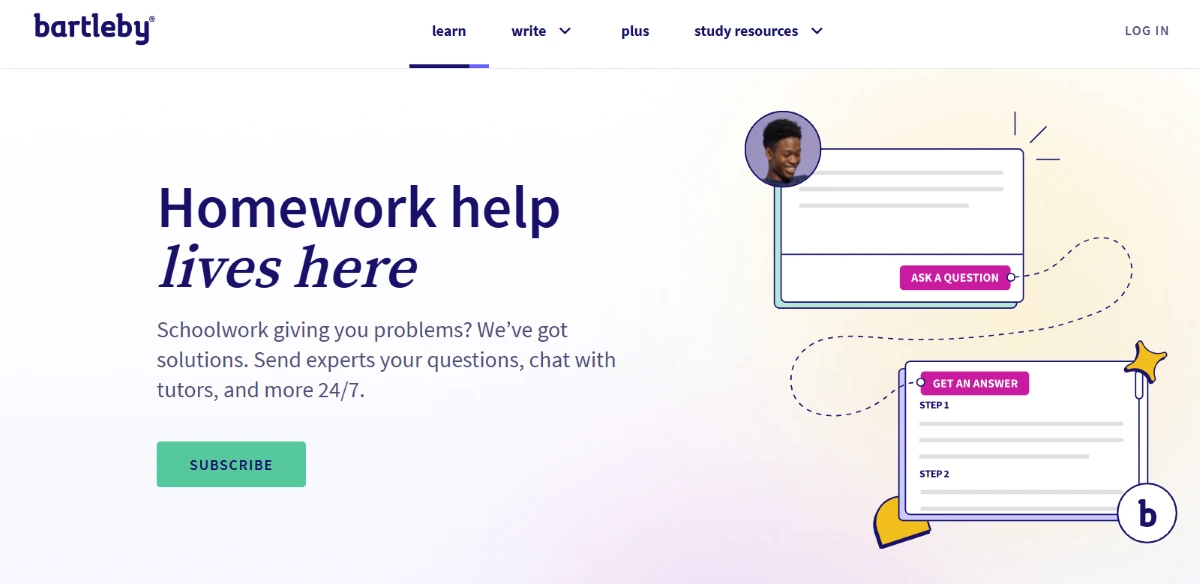
Conclusion
Bartleby has emerged as a convenient study companion for students, offering a blend of instant solutions and expert support across a wide range of subjects. Its strengths lie in the breadth of content (millions of solutions and numerous subjects covered) and the integration of tools – students can get help with a calculus problem one minute and check their English essay for plagiarism the next. The platform’s 24/7 availability and relatively affordable subscription make it an attractive option for those who need frequent homework help. Bartleby particularly shines for quick reference: it can save time when you’re stuck and need to see how a problem is solved, or when you want to verify your work against an expert solution.
However, Bartleby is not without weaknesses. The most notable drawbacks are related to customer experience: some users have faced headaches with subscription cancellations and felt the customer support was not as responsive as it should be.“ Additionally, the limited number of questions you can personally ask each month can be a hurdle for students who have a lot of doubts (unless they are willing to pay more for extra tutoring). While the content quality is generally good, it’s always possible to encounter an incorrect solution, so one cannot rely on it blindly. In essence, Bartleby is a helpful aid, but not a guaranteed one-stop solution for every problem – students should still use their judgement and not become overly dependent on it without learning the material.
For those considering alternatives or complements to Bartleby, My Engineering Buddy stands out as a compelling choice, especially for STEM students. Where Bartleby offers breadth, My Engineering Buddy offers depth in its specialized area. MEB’s personalized tutoring approach addresses some of Bartleby’s gaps by providing direct human interaction and tailored explanations. In situations where Bartleby’s generic solution isn’t enough or when a student needs step-by-step guidance through a tough concept, My Engineering Buddy can be the “lifeline” that bridges the understanding gap. Many students have found success by using Bartleby for routine homework checking and turning to My Engineering Buddy for intensive help on challenging assignments or exam prep. By leveraging both, learners can cover both breadth and depth – getting quick answers when appropriate and deep dives when necessary.
In conclusion, Bartleby is a powerful study resource with notable advantages in convenience and multi-subject support, making it a popular choice in 2025 for students and parents in developed countries looking to boost academic performance. It streamlines learning and can reduce stress by providing reliable help on demand. Yet, it’s important to be aware of its limitations and to use it as part of a balanced study strategy. Always remember that tools like Bartleby are there to assist you in learning, not replace the learning itself. And when you do need that extra bit of help – a more human touch or specialized expertise – services like My Engineering Buddy are excellent allies to have. Together, such resources ensure that no student has to feel alone with difficult homework or daunting coursework. The key is to use the right tool for the right situation: Bartleby for breadth and quick support, and My Engineering Buddy (or similar) for personalized depth, thereby maximizing your learning outcomes.
******************************
This article provides general educational guidance only. It is NOT official exam policy, professional academic advice, or guaranteed results. Always verify information with your school, official exam boards (College Board, Cambridge, IB), or qualified professionals before making decisions. Read Full Policies & Disclaimer , Contact Us To Report An Error

